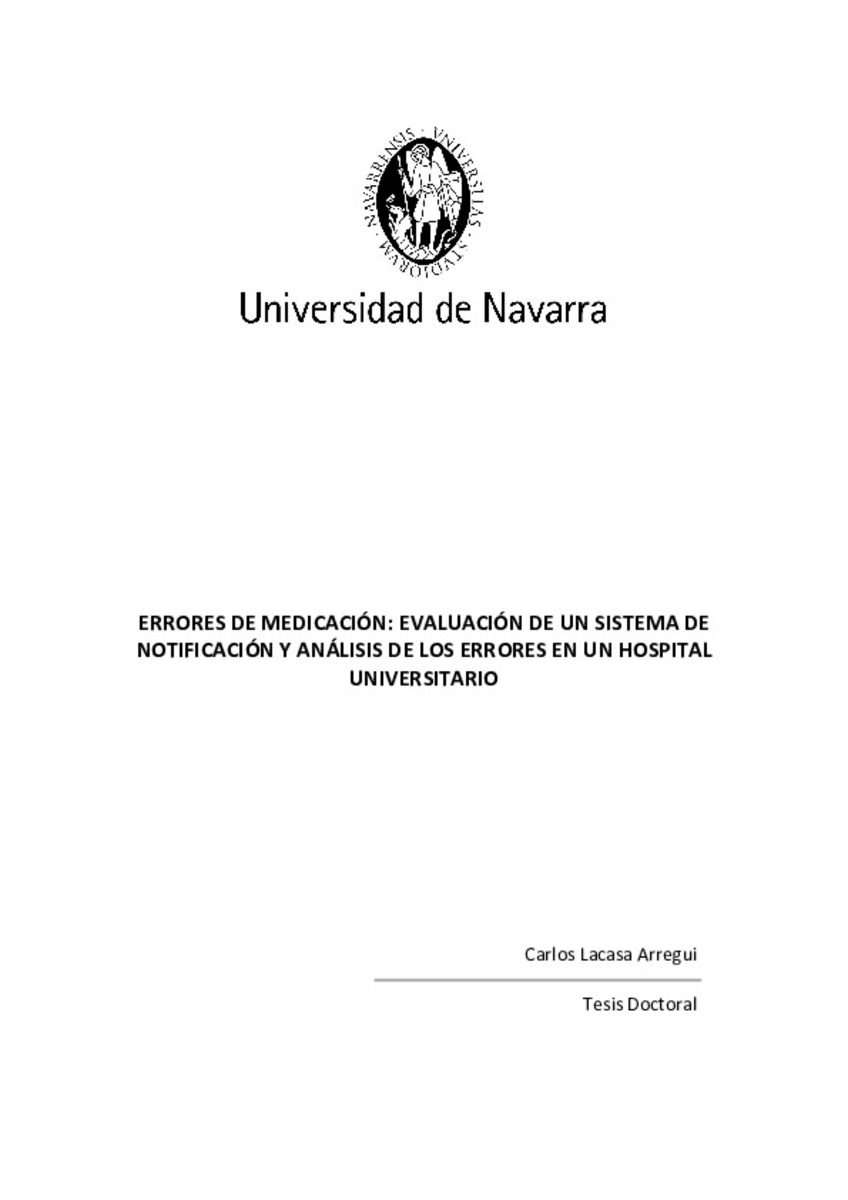Full metadata record
| DC Field | Value | Language |
|---|---|---|
| dc.contributor.advisor | Ortega-Eslava, A. (Ana) | - |
| dc.creator | Lacasa, C. (Carlos) | - |
| dc.date.accessioned | 2019-11-21T11:57:59Z | - |
| dc.date.available | 2019-11-21T11:57:59Z | - |
| dc.date.issued | 2019-11-21 | - |
| dc.date.submitted | 2016-03-15 | - |
| dc.identifier.citation | LACASA ARREGUI, Carlos. “Errores de medicación: evaluación de un sistema de notificación y análisis de los errores en un hospital universitario”. Ortega, A. (dir.). Tesis doctoral. Universidad de Navarra, Pamplona, 2016. | es_ES |
| dc.identifier.uri | https://hdl.handle.net/10171/58489 | - |
| dc.description.abstract | Reporting systems are a valuable tool for detecting errors, analysing them, and for designing initiatives to promote patient safety. The aims of this study were: to describe the design and implementation of a medication error reporting system in the clinical practice context and included in a hospital quality plan, to evaluate the reporting system as an improvement tool, and to analyse notified medication errors in order to propose measures to increase patient safety. We retrospectively analysed all medication errors reported since the introduction of the system, the root cause analyses carried out, and the proposed and implemented improvement actions. We evaluated the tool validity and utility analysing the congruence between narrative descriptions and options selected from pull-down menus on the medication errors forms, and between information on the report and reality, as well as analysing the possibility of classifying medication errors based on the information included in the tool and concordance between different evaluators. We evaluated user satisfaction through a questionnaire given to nurses and doctors. In addition, we used two multivariable logistic regression models to determine independent factors associated with errors reaching the patient and with errors causing harm, respectively. A total of 2,578 medication errors were reported from May 2004 to December 2014. Of these, 94.0% caused no harm, 2.7% caused harm and 1.7% were potential errors. Nurses reported 71.3% of errors, 24.8% were notified by pharmacists and 3.9% by doctors. Regarding the process involved, 44.6% were prescription errors, 33.5% were related to preparation/dispensing and 17.6% to preparation/administration. After the root cause analyses some improvement actions affecting different processes were proposed, 69% of them were implemented. At least one discrepancy between narrative text and options selected from pull-down menus on the reporting form was present in almost 50% of the analysed reports. In those medication errors followed in depth, some discrepancy with reality existed in 40% of the reports. Concordance between evaluators was lower in recurrence probability, severity and identification of causes or contributing factors. However, discrepancies were not critical and did not hindered medication errors classification. Professionals consider the tool easy to use but tend to underreport. Multivariable models indicated that medication errors with higher odds of reaching the patient were: incorrect dose or drug, omission of a dose or a drug, wrong patient, wrong administration technique, medication errors in preparation/manipulation/packaging, those with various persons involved, errors in preparation/administration, and those with anticancer or anti-infective drugs. Therefore, the medication errors reporting system was successfully implemented, in addition, improvement actions were also introduced. Simple medication error reporting tools, as the one presented and analysed here, are valid and useful. Adding more pull-down menus and helping tools will increase identification of medication error causes and contributing factors. Narrative section in the reporting form is useful. Increasing hospital personnel training and offering more feed-back information would motivate reporting. Additional safety measures are necessary to check the right drug, dose and administration technique. | es_ES |
| dc.language.iso | spa | es_ES |
| dc.rights | info:eu-repo/semantics/openAccess | * |
| dc.subject | Análisis de fármacos | es_ES |
| dc.subject | Materias Investigacion::Farmacia | es_ES |
| dc.title | Errores de medicación: evaluación de un sistema de notificación y análisis de los errores en un hospital universitario | es_ES |
| dc.type | info:eu-repo/semantics/doctoralThesis | es_ES |
Files in This Item:
Statistics and impact
Items in Dadun are protected by copyright, with all rights reserved, unless otherwise indicated.






